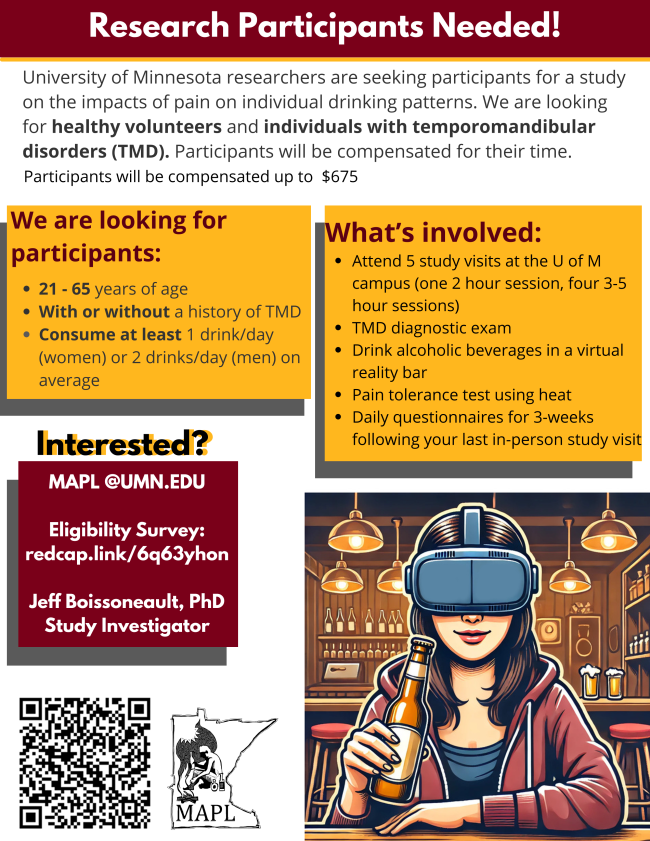Why Should I Participate in Research?
By participating in clinical studies, you play an integral role in advancing scientific knowledge on TMJ disorders. Researchers need people with a TMJ disorder, along with healthy individuals. By participating, you can help generate much-needed data to help yourself and others!
By participating in clinical studies, you play an integral role in advancing scientific knowledge on TMJ disorders. Researchers need people with a TMJ disorder, along with healthy individuals. By participating, you can help generate much-needed data to help yourself and others!
The National Institutes of Health (NIH) has resources to help you understand clinical trials and their role in evaluating new treatments. This infographic is a great place to start. Visit NIH Clinical Research Trials and You, a comprehensive website for people who want to learn about clinical trials or participate in one. You can also check out their informative FAQ.
Study Opportunities
University of Minnesota (Participate In-Person)

Middlesex University, London and Uppsala University, Sweden (Participate Online)
The TMJ Association was invited to help share a research opportunity for adults living with fibromyalgia.
A team of researchers from Middlesex University and Uppsala University, collaborating with experts from multiple institutions, is conducting an online survey to better understand fibromyalgia and its connection to gastrointestinal conditions. If you have been diagnosed with fibromyalgia, you are encouraged to participate by completing the survey here: https://eu.surveymonkey.com/r/WXGS5PR
Your input could provide valuable insights that may improve care and support for those affected by fibromyalgia.
University of Belgium (Participate Online)
A research team from the Faculty of Rehabilitation Sciences of Hasselt University in Belgium is investigating the relationship between the intensity of daily physical activity and chronic musculoskeletal pain. They will be looking at fibromyalgia, chronic temporomandibular disorder, osteoarthritis, chronic neck pain, chronic shoulder pain, and chronic low back pain. The study involves an online survey which will take approximately 50 minutes to complete. More details and a link to the study is available at: https://uhasselt.qualtrics.com/jfe/form/SV_etl78e58y2YeUDQ
University of Connecticut School of Dental Medicine (Participate In-Person)
This federally funded research project provides non-surgical treatments to persons with pain in the area of the TMJ. The purpose is to test a new treatment approach. All volunteers will get an X-ray of the face, and will receive a splint (a mouth guard), plus non-steroidal anti-inflammatory drugs (like Advil), and weekly monitoring, as well as additional instruction in coping and managing the pain of temporomandibular dysfunction (TMD).
Those eligible for participation must meet the following conditions:
- TMD-related pain for at least 3 months.
- Must live in proximity to UConn Health, Farmington, CT, to allow for treatment, monitoring of progress, and follow-ups.
To view the patient consent form, click here. Call 860-679-2745 for more information or visit:
https://health.uconn.edu/dental/patient-services/oral-and-maxillofacial-surgery/tmj-treatment/
